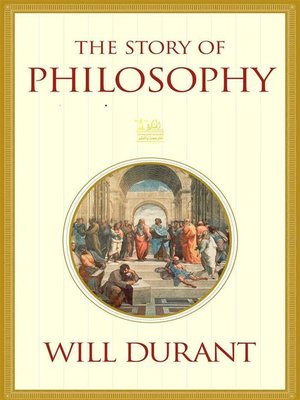
Sign up to save your library
With an OverDrive account, you can save your favorite libraries for at-a-glance information about availability. Find out more about OverDrive accounts.
Find this title in Libby, the library reading app by OverDrive.



Search for a digital library with this title
Title found at these libraries:
| Library Name | Distance |
|---|---|
| Loading... |
Will Durant and Ariel Durant, in full, respectively, William James Durant and Ariel Durant, née Ada Kaufman, or Ida Kaufman, (respectively, born Nov. 5, 1885, North Adams, Mass., U.S.—died Nov. 7, 1981, Los Angeles, Calif.; born May 10, 1898, Prosurov, Russia—died Oct. 25, 1981, Los Angeles), American husband-and-wife writing collaborators whose Story of Civilization, 11 vol. (1935–75), established them among the best-known writers of popular philosophy and history.
Will Durant's writing career began with the publication of Philosophy and the Social Problem (1917). His second book, The Story of Philosophy (1926), sold more than two million copies in less than three decades and was translated into several languages. The following year his only novel, Transition, appeared. It is largely an autobiographical account of his own early social, religious, and political disillusionments. In 1970 Durant published Interpretations of Life: A Survey of Contemporary Literature. This work, an expansion of the notes of a lifetime of reading modern literature, is informal and anecdotal and is aimed at the general reader.
In 1913, while teaching at the Ferrer Modern School in New York City, Durant married one of his pupils, Ada (or Ida) Kaufman, whom he called Ariel; she later adopted the name legally. Though she had been involved in the writing of every volume of The Story of Civilization, Ariel Durant was not given formal recognition as Will Durant's collaborator until 1961, with publication of the seventh volume, The Age of Reason Begins. She continued as coauthor with her husband of the subsequent volumes in the series, including the Pulitzer Prize-winning 10th volume, Rousseau and Revolution (1967). They described their work together in A Dual Autobiography (1977).
Will Durant's writing career began with the publication of Philosophy and the Social Problem (1917). His second book, The Story of Philosophy (1926), sold more than two million copies in less than three decades and was translated into several languages. The following year his only novel, Transition, appeared. It is largely an autobiographical account of his own early social, religious, and political disillusionments. In 1970 Durant published Interpretations of Life: A Survey of Contemporary Literature. This work, an expansion of the notes of a lifetime of reading modern literature, is informal and anecdotal and is aimed at the general reader.
In 1913, while teaching at the Ferrer Modern School in New York City, Durant married one of his pupils, Ada (or Ida) Kaufman, whom he called Ariel; she later adopted the name legally. Though she had been involved in the writing of every volume of The Story of Civilization, Ariel Durant was not given formal recognition as Will Durant's collaborator until 1961, with publication of the seventh volume, The Age of Reason Begins. She continued as coauthor with her husband of the subsequent volumes in the series, including the Pulitzer Prize-winning 10th volume, Rousseau and Revolution (1967). They described their work together in A Dual Autobiography (1977).







